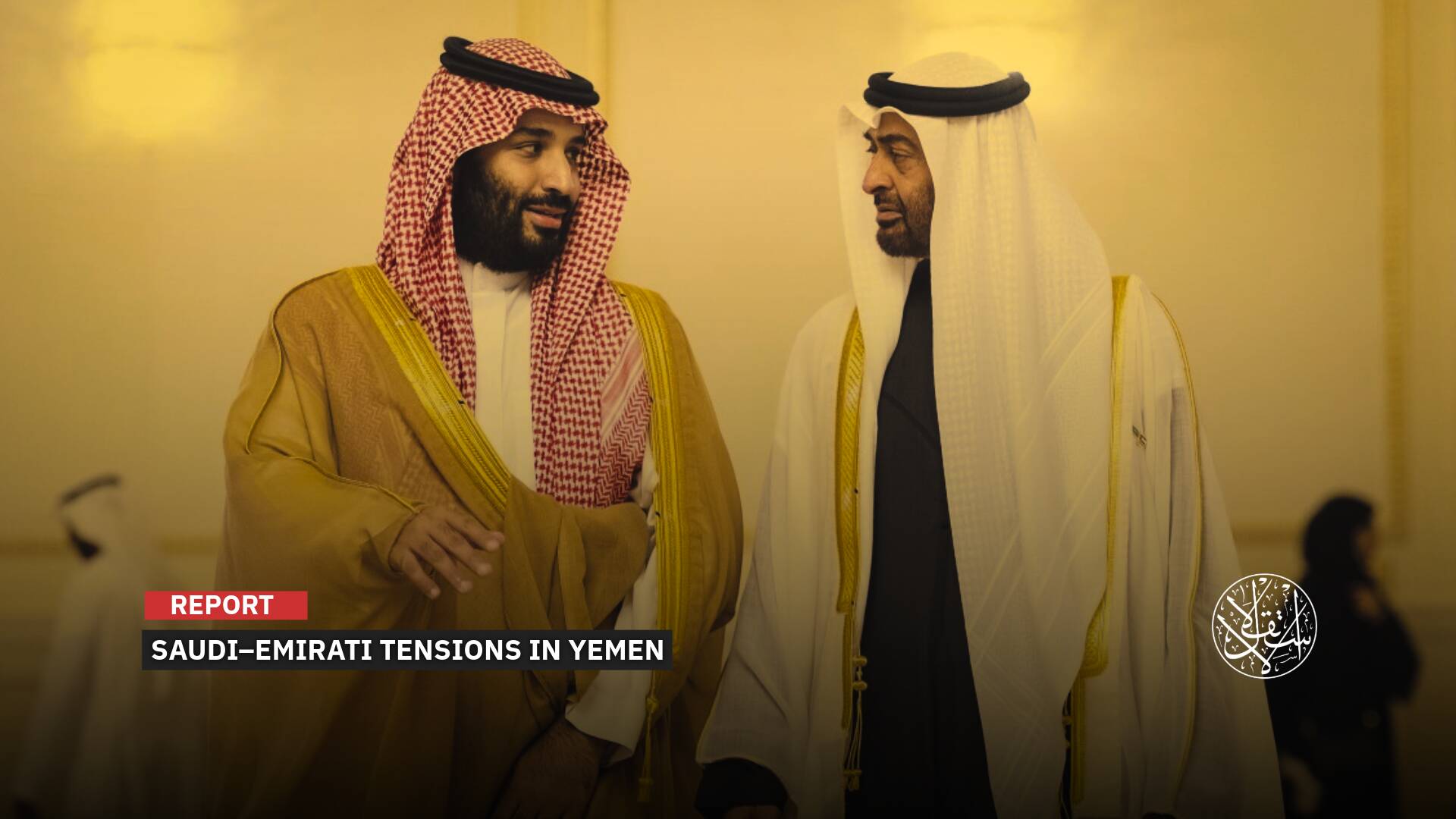Eyeing Egypt and Saudi Arabia: What Does It Mean for America to Link Arms Sales to Human Rights?

On February 23, 2023, U.S. President Joe Biden’s administration announced a new policy for transferring or selling weapons to foreign countries to further protect human rights.
This new policy is an “updating” to the conventional arms transfer and sale policy established by the administration of former President Donald Trump in 2018, who was known for his strong relationships with repressive Middle Eastern regimes.
Trump’s policy clearly focused on the “economic benefits” of selling more military equipment abroad, without concern for human rights issues, especially for countries such as Saudi Arabia and Egypt.
This is why the new U.S. policy raises controversy about the goals of linking economic interests with the principles of protecting human rights, especially since Washington is known for exploiting this moral file as one of its foreign policy tools.
The new policy also raises questions such as: Will aid or military sales be a weapon used by America to compel the regimes of Abdel Fattah el-Sisi and Mohammed bin Salman to stop human rights violations and to pressure them to release more detainees? Or are these pressures a warning to protect the two regimes from themselves, as their excessive repression would lead to their collapse and then harm America’s interests, as they are loyal executors and protectors of American interests in the region?
New Policy
On February 23, 2023, Reuters quoted three U.S. State Department officials as saying that the Biden administration intends, with this new policy, to announce a long-awaited reform of the arms export policy that focuses on human rights.
The new policy would also include a review of security assistance, intergovernmental arms transfers, and sales of U.S. military equipment and services, according to the same source.
It was remarkable that the new policy memorandum, that Al-Estiklal reviewed, also stipulates against torture and ensures that arms transfers (from the U.S. to allied countries) do not fuel corruption.
Also, the sale of U.S. weapons (to certain countries) will not be approved if the State Department determines that the weapons will likely be used to commit or facilitate genocide, crimes against humanity, or serious violations of international law.
The previous policy was to transfer such weapons only if Washington had actual knowledge that they would be used in such actions.
Reuters previously confirmed on August 4, 2021, that the Biden administration is considering such a shift in the policy of selling weapons and security equipment.
The matter was also related to the National Security Strategy, which was announced by the Biden administration in October 2021.
However, its official disclosure was delayed due to factors, including the withdrawal of U.S. forces from Afghanistan in August 2021 and the war in Ukraine that started a year ago.
The United States is by far the largest arms dealer in the world, selling more than $100 billion worth of weapons, services, and training annually.
Members of Congress often raise human rights concerns when they oppose arms exports.

Principles or Interests?
On March 11, 2021, an American journalist asked an embarrassing question to U.S. State Department spokesperson Edward Price about the lack of clarity in Biden’s policy toward the Egyptian regime headed by Abdel Fattah el-Sisi with regard to the human rights file and arms sales.
He asked him: “You’ve previously said that selling weapons to Egypt doesn’t interfere with your commitment to human rights. Do you not see the contradiction in saying that selling weapons to a dictatorship that openly oppresses its own people and that tortures its own people has got nothing to do with your commitment to human rights?”
Price smartly responded: “It is absolutely true that there will be no blank checks for any country—a close security partner, a competitor, an adversary. That is absolutely true. The United States will not check our values, will not check our principles, at the door in any relationship. Candidate Biden made that very clear; President Biden has made that very clear; Secretary Blinken has made that very clear.”
He also said: “When it comes to Egypt, it is true that Egypt plays an important role in promoting some of our key interests in the region: regional security and stability through the guardianship of the Suez Canal; counterterrorism cooperation; and its leadership in promoting Middle East peace,” meaning that America is looking for its interests.
“Secretary Blinken has had an opportunity to discuss some of these issues with his counterpart, Foreign Minister Shoukry, just as we raise human rights, just as we raise our values. These two things, they’re not separate. They’re inextricably linked. If we don’t stick up for our values, if we don’t stick up for human rights, we’re not sticking up for our interests. We recognize that, and we can do both.”
This statement clearly revealed the features of Biden’s policy toward Sisi and how America considers its interests more important than adhering to values and principles, despite Price’s assertion that the United States can pursue its interests and adhere to its values. It also revealed how the Sisi regime is being dealt with in accordance with America’s interests or values, and how, if America’s interests are burdened with Sisi, it will overlook human rights.
This happened when America rewarded Sisi with arms deals after he played the role that America asked him to do, a mediator to stop the firing of resistance rockets from Gaza at “Israel” in the May 2021 war.
On the other hand, the Sisi regime did not forget to give credit to the Biden administration and take into account its threats.
It was remarkable, after announcing the American position, by linking arms deals with human rights, that Egypt voted on February 23, 2023, and for the second time since March 2022, at the United Nations in favor of a European–American resolution calling on Russian forces to immediately withdraw from Ukraine without conditions, despite its relationship with Moscow. This is another indicator to look for interest.

Sisi Is an ‘Ally’
Despite what is reported about the link between arms deals and human rights, analysts believe that Sisi, even if he is not Biden’s favorite dictator, will remain, like all Egypt’s military presidents, the Pentagon’s favorite man, and for these reasons, Biden will not be able to pressure him for the interests of America.
They believe that Biden will unlikely risk undermining the “strategic relations” between his country and the Sisi regime for the sake of human rights issues because it is one of the regimes most protective of U.S. interests in the region.
Especially its protection of Israeli security and the Suez Canal security through which warships and American goods pass.
This was proved by the Egyptian journalist residing in Washington, Hafez al-Mirazi, in an article on the Egyptian website al-Manassa News, in early February 2023.
In the article, al-Mirazi affirmed that the U.S. Department of Defense is the one who moves Sisi, and the U.S. military is the one who makes decisions regarding Egypt, not the foreign ministry or the presidency.
He explained that there is a peculiarity in the U.S. military relationship with Egypt, and the top priority in U.S.–Egyptian relations is to maintain stability in the sense of preserving the status quo of U.S. “friendly” regimes.
Thus, no elected U.S. president seeks to change the regimes of friendly countries unless the situation explodes at that point, and he is forced to choose between difficult alternatives that he did not seek, as former President Barack Obama did with the case of former President Hosni Mubarak’s removal.
Al-Mirazi added: “The most important coordination at the time was to remove Mubarak and not accept opening fire on the demonstrators, not through the U.S. State Department, but rather the Ministry of Defense, that is, the Pentagon with the military council.”
Obama did not intervene in what the American media considered a military coup in Egypt in 2013 against the late President Mohamed Morsi “because the American military found that it was better for America’s interests, whether with Israel or the counter-revolutionary Gulf,” according to the article.
In determining who is targeted by this policy, one of the U.S. officials, in his statement to Reuters on February 23, 2023, refused to specify the countries that might be affected by the new policy, saying only: “We are looking at a policy of prevention when there is a risk of violation of human rights.”
That is why Reuters confirmed that “defense companies and activists scrutinize such policies for insight into the administration’s posture as it balances commercial interests of exporters like Lockheed Martin Co (LMT.N) and Raytheon Technologies (RTX.N) against the country’s stated commitment to human rights.”
The Stockholm International Peace Research Institute (SIPRI) report, issued on March 15, 2021, previously referred to a “paradox” which is the significant increase in arms exports from Western countries to repressive Arab regimes, despite the escalation of human rights violations, and Europe’s refusal to ban arms exports to these liberties violations countries.
Egypt increased its imports of arms financed mostly by loans and debts in the past five years during the Sisi era by 136%, according to the Stockholm Institute report.
Egypt’s arms imports accounted for 5.8% of the volume of global arms imports, and Russia was its largest supplier with 41%, followed by France (28%) and then America (8.7%), according to the Stockholm Institute.
According to Al-Estiklal Arabic’s previous report, experts confirmed that the increase in Egypt’s arms imports falls within 3 items: the first is in the form of “bribery” for Western countries to overlook human rights violations.
The second is “commissions” that Sisi and senior military officials receive, in the form of percentages of each deal, as was revealed in the deals of the late President Hosni Mubarak.
The third is carrying out military adventures, such as striking targets in Libya to support Khalifa Haftar, or facing other regional challenges, despite not participating in any actual wars since 2011.

A study by the Carnegie Institute on November 24, 2020, confirms that Sisi deliberately links the international support provided to his regime with an increase in debt and arms deals, as the government’s spending of huge sums on weapons, and the triple volume of arms imports between 2014 and 2018, played a key role in consolidating its international security network.
The regime’s transformation into a major importer of weapons will implicate Western countries and their defense industry in suppressing popular protests and obstructing the condemnation of human rights violations, according to Carnegie’s study.
Egypt Human Rights Caucus plays a major role as a parliamentary club calling for an investigation into the misuse of American weapons by President Abdel Fattah el-Sisi.
Since its formation on January 25, 2021, it has issued eight statements on repression and arrests in Egypt and has called for stopping providing military aid to the Sisi regime for violating human rights, thus forming the first foreign pressure group to disturb the Sisi regime.
Egypt Human Rights Caucus is led by Democratic representatives in Congress, Donald A. Baer and Tom Malinowski, who said in its founding statement that the bloc aims to achieve a kind of “rebalance” between the U.S. government’s relationship with Egypt and its human rights violations.
The bloc’s pressure has already succeeded in releasing detainees and freezing $130 million in aid in September 2021.
On February 18, 2021, the Washington Post editorial board criticized Biden for continuing business as usual with Trump’s favorite dictator after his administration approved a $197 million arms deal with Egypt.
The Washington Post said Biden’s pledge there would be no more blank checks for Trump’s favorite dictator are just words, and he needs to prove that.
On February 18, 2021, the U.S. State Department responded to criticism of its conclusion of a missile deal with Egypt by stressing that arms sales to Egypt do not hinder America’s continued focus on its human rights record.
Hard Test
Regarding the new policy, Politico said on February 23, 2023, that the dispute is about whether Washington believes that the client state will use American weapons against its population or not.
It is unknown by what criterion this will be evaluated, as the Sisi regime used American weapons to suppress demonstrations against his coup on July 3, 2013, including Apache helicopters, as U.S. newspapers reported at the time.
A senior State Department official said that if his country deems that a country is likely to harm its population with this weapon, it may refuse to sell these weapons, according to Politico.
However, the same official refused to go into details when asked about specific countries, especially those that have a long history of human rights violations, such as Saudi Arabia, Egypt, and other countries.
For its part, the U.S. website Responsible Statecraft confirmed on February 23, 2023, that Biden’s new arms sales policy will put human rights violators under control, but experts are waiting to see the results.
Biden’s anti-torture policy represents a major shift from President Donald Trump’s policy, which focused on the economic benefits of U.S. arms sales and excluded the risks of misuse.
This policy advances important human rights security sector goals in stronger ways than previous policies, as military expert John Abramson said.
But Responsible Statecraft quotes researcher William D. Hartung of the Quincy Institute as saying that the “main question” is whether or not this policy focus on human rights will be supported in practice.
The administration’s actual record against its rhetoric will serve as a test of whether the new policy is a fresh start or ends up promoting business as usual in arms transfers, he announced.
The United States has sold weapons to about half of the countries in the world, including notorious human rights violators such as “Israel,” Egypt, Saudi Arabia, the United Arab Emirates, the Philippines, and others, according to him.
In 2022, the Biden administration approved a controversial sale of helicopters and other military equipment to Egypt despite significant opposition from Congress.
The problem, therefore, is that America has already sold weapons to allies accused of violating human rights and using them against their own people.
However, observers believe that the Biden administration has shown indications of changing this American policy regarding human rights violations by Egypt and Saudi Arabia and criticized the two countries, but the arms deals and security cooperation are still continuing.
During his visit to Egypt in January 2023, U.S. Secretary of State Antony Blinken was keen to talk about the need for progress in human rights and the release of political detainees during his meeting with Sisi and then Foreign Minister Sameh Shoukry.
He stressed that the United States will continue to put pressure on Egypt with regard to human rights, calling for the need to release “political prisoners” and take “reforms” that allow freedom of expression, according to Reuters.
He also said in his press conference in Cairo that starting the process of detainees’ release and completing it are two different things, and it is important that this process moves forward, according to Mada Masr website on January 30, 2023.

Observers believe that the regime of Mohammed bin Salman in Saudi Arabia will also represent a problem and a crisis for the American strategy related to linking military cooperation and weapons with the issue of human rights because of vital American interests there.
America has already threatened, several times, to punish Saudi Arabia for the killing of journalist Jamal Khashoggi and for bin Salman’s strengthening of his relationship with Moscow to reduce oil production, which harms the Western blockade on Russia.
Human rights organizations have called for arms sales to countries like Saudi Arabia and the United Arab Emirates to be halted due to civilian casualties in the Yemen war, but the Biden administration has not implemented any actual sanctions.
On January 27, 2021, the Biden administration temporarily suspended arms sales to Saudi Arabia and the UAE, claiming a broader review of billions of dollars’ worth of agreements concluded by the administration of his predecessor, Donald Trump, and then resumed them on November 4, 2021, with an arms deal to Saudi Arabia worth $650 million dollars, according to CNN.
It announced the cessation of U.S. arms sales to Saudi Arabia on October 12, 2022, to review U.S.–Saudi relations as part of sanctions against the kingdom after its decision to reduce oil production in partnership with Russia, against Washington’s desire, but it continued to send previously agreed shipments.
The rise in oil prices will remain a “pressure card” in the hands of bin Salman toward Biden, as well as normalization with “Israel,” in addition to the constant threat to move to cooperate with Russia militarily and buy weapons from Moscow, which threatens the delicate balance of relations between the two countries.
Sources
- Memorandum on United States Conventional Arms Transfer Policy
- Exclusive: Arms sales under Biden to get stricter human rights review, officials say
- Biden’s new weapons sales strategy puts more emphasis on human rights
- New Biden arms sale policy puts human rights abusers on notice
- New Conventional Arms Transfer focuses on human rights over economics
- The military makes the decisions, but Blinken has the youth [Arabic]










